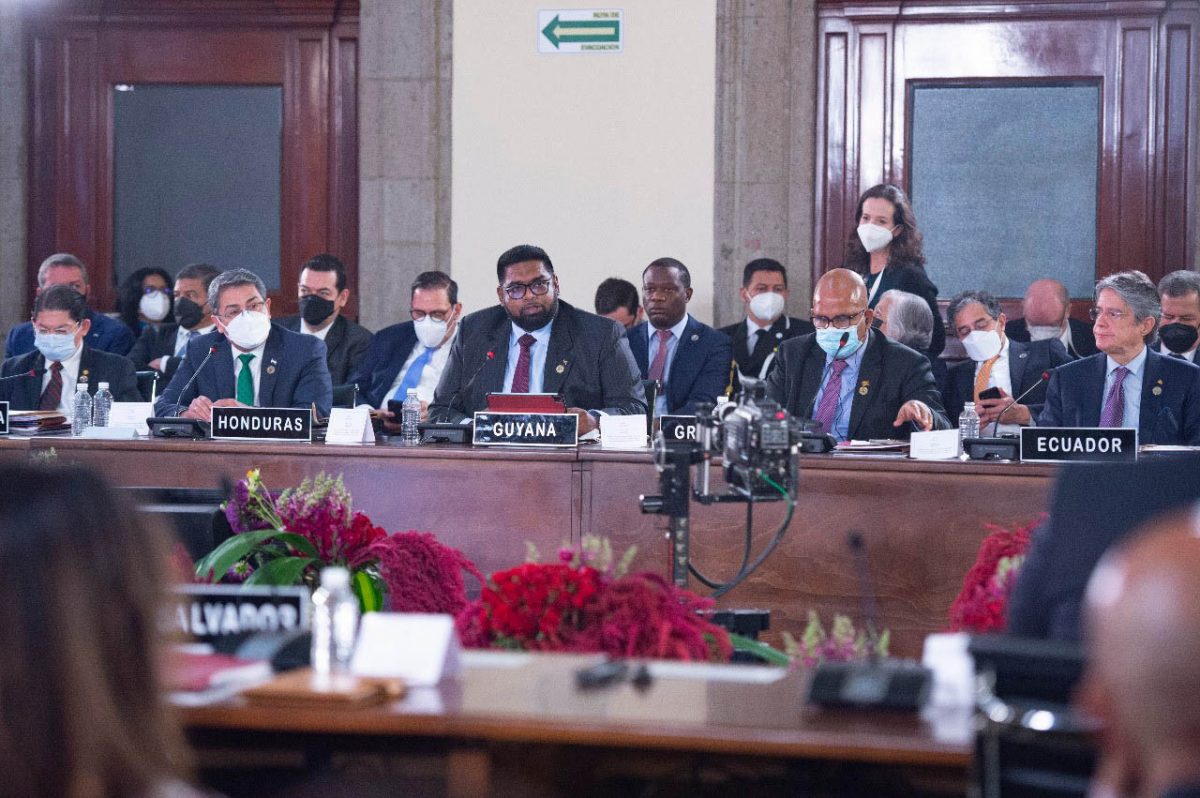President Irfaan Ali on Saturday told the Sixth Summit of the Community of Latin American and Caribbean States (CELAC) that never again must the region be held hostage to vaccine nationalism and it must therefore combine resources.
For months after the production of vaccines to battle the COVID-19 pandemic, Guyana and other countries in the region were unable to access the jabs as these were taken up by the developed world.
Guyana eventually succeeded in purchasing Russia’s Sputnik vaccine which is yet to be given emergency recognition by the World Health Organisation. Speaking at the Mexico City, Mexico summit, Ali told the leaders that CELAC, which comprises 33 Latin American and Caribbean countries, must never again be victims of vaccine nationalism.
“We must combine our scientific resources – intellectual and material – so as to reduce our dependence on the developed world in the event of future health crises, and to chart a common strategy to exit this pandemic and bolster economic recovery”, he told the leaders.
The President highlighted that this year’s gathering of the Summit takes place as the continuous battle against the COVID-19 pandemic rages on and that both Latin America and the Caribbean have been victims of vaccine hesitancy and vaccine nationalism.
He stressed that Guyana will continue to call for governments and multilateral organisations to accelerate research, development, production and global distribution of COVID-19 vaccines and treatments based on the principle of international solidarity.
“The struggle for equitable access to vaccines must continue on all fronts with the paramount aim of preserving life and the right to health above all.”
The Head of State added that an integrated mechanism must be crafted to better respond to future pandemics.
“We must invest in the capacity within the region to self-sustain our efforts. So far, this pandemic has taught us how (insular) the world can become. Secondly, we must lead efforts for a fairer global system not only in resource allocations but in regulation and approval. We must think about this carefully”, he said.
The President also said that the socio-economic impact of the pandemic will have lasting and lingering effects. This, he said, was reinforced by the Economic Commission for Latin America and the Caribbean which warned that the health crisis has worsened the problems of low investment, unemployment, inequality and poverty.
Climate change
In a wide-ranging address, the President said that Guyana was committed to providing strong leadership, especially on issues of climate change and food security.
Ali said that the regional bloc’s problems extend beyond structural issues and also include the existential threat of climate change. He said that the region will be afforded an opportunity to speak with a collective voice and to stress the urgency of increased and readily available financing for mitigation and adaptation at the 26th Session of the Conference of Parties (COP26) of the United Nations Framework Convention on Climate Change.
At COP26 in Scotland, a systemic approach in dealing with issues of the environment and climate change should be agreed on, he asserted.
“This approach must speak to issues of access to resources, to address adaption and mitigation, establishment of a climate vulnerability fund, and fulfilment of pledges made by the developed world”, the President declared.
Ali also said that Guyana supports the establishment of a voluntary fund to facilitate a regional disaster response. With the combined effect of the pandemic and climate change hampering the developing world’s progress in achieving the Sustainable Development Goals (SDG) by 2030, President Ali urged that the region “must therefore champion the call to address this through debt rescheduling and access to soft financing.”
Ali, the release said, emphasised that food security is vital to the post-pandemic recovery. He added that Guyana strongly supports regional cooperation in ensuring a more food secure Latin America and the Caribbean.
The President also told the Summit that peace and security in Latin America and the Caribbean must be founded on political systems in which democracy, the rule of law and human rights are upheld, and in which the sovereignty and territorial integrity of states and the sanctity of treaties are respected. This latter statement would be taken as a reference to the Guyana-Venezuela border controversy and the intransigent behaviour of Caracas. Venezuela’s President Nicolas Maduro was present at the summit.
Minister of Foreign Affairs and International Cooperation, Hugh Todd and the Director of Projects in the Office of the President, Marcia Nadir-Sharma accompanied the President to the meeting.






